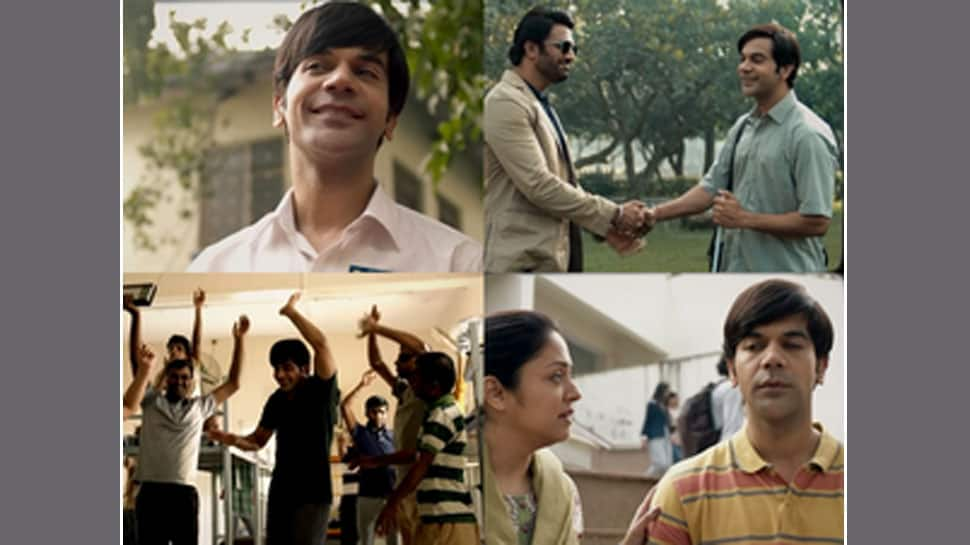Srikanth Movie Review: Rajkummar Rao’s Controlled Acting Uplifts Motivational Story | Movies News

Film: Srikanth
Duration: 134 minutes
Director: Tushar Hiranandani
Cast: Rajkummar Rao, Jyothika, Alaya F and Sharad Kelkar
Camera: Pratham Mehtaa
Music: Tanishq Bagchi, Anand Milind
Duration: 134 minutes
IANS Rating: ***
Mumbai: Cinema is one medium that often educates us about life. All that we see around us, observe, endure, and experience is translated onto celluloid in the form of stories — fictional or biographical — though the narrative is built primarily from the filmmaker’s point of view.
This week’s Hindi release, ‘Srikanth’, is a biographical film on the life of Srikanth Bolla, a visually impaired industrialist and founder of Bollant Industries. Directed by Tushar Hiranandani, it stars Rajkummar Rao in the eponymous role with Jyotika, Alaya F and Sharad Kelkar playing the key supporting characters.
For Srikanth Bolla and his poor parents, life is challenging, more so in the Seetharamapuram village in Machilipatnam, Andhra Pradesh. His father (Srinivas Beesetty) has a dream and names him after his favourite cricketer, Krishnamachari Srikkanth. His joy knows no bounds at the time of his son’s (Arnav Abdagire) birth, but it is shortlived when he comes to know that his child has a visual impairment.
Soon, he realises that his son is more than special with great learning skills, an achievement that makes Srikanth stand out in his class. When children in the neighbourhood make fun of Srikanth calling him names because of his disability, the boy keeps quiet and takes it all lying down. Not that Sri can’t fight the bullies.
Sri’s supreme self-confidence turns into swagger when he is sent to a school for the visually challenged in Hyderabad. He meets his teacher Devki (Jyotika), who almost instantly takes him under her wing and goes on to stand beside him like a rock throughout his life. Devki takes to him and encourages him to face any formidable challenge that comes his way.
The young student confronts many hurdles along the journey of his education. The first one appears when his school denies him admission in the science stream. Jyotika hires a lawyer who argues in court that for someone who cannot see, Srikanth has great potential to analyse Newton’s law of gravity — a fact the boy proves in court.
Dropping his walking stick to the floor, he demonstrates that he may not be able to see the stick fall but can hear its velocity. That puts an end to the defence lawyer’s argument that Newton had seen the apple fall and thus had discovered the law of gravity.
Later he gets admission into MIT in the US, but is not allowed to board the plane because he was travelling alone. So he launches into a presentation with a display of his knowledge of the entire airplane, down to its exits and washrooms.
He makes a mark at MIT’s Sloan School of Management where he stands out as one of the brightest students of his class. He comes back to India in 2012 to create job opportunities for other visually impaired young people like him. He starts a groundbreaking enterprise that provides employment to unskilled and differently-abled individuals to create eco-friendly products.
The film chronicles the struggles of Srikanth right from his childhood and tells us a true story that is inspiring for sure. It is an extraordinary narrative of perseverance and achievement, from Srikanth’s 98 per cent in school to his getting selected as the first visually impaired international student at MIT after being denied entry into the IITs.
Rajkummar Rao as Srikanth is unbelievably convincing. His gestures, body language and speech perfectly match the character’s requirements and there isn’t a single exaggerated action that would make us look at him as an actor portraying a role.
The only aspect that makes his performance a tad forced is not for any fault of his technique, but for the director’s obsession to force it down on us as a contrived mechanism. By allowing the camera to capture every twitch of his eyebrow and facial expression, the focus is more on how good an actor Rao is, which he is. We wish it were done organically rather than being thrust down upon us. As a result, one pays more attention to Rao, the actor, and not the character.
Jyotika as his teacher is good too. Sharad Kelkar as an industrialist friend who is more than a do-gooder has an impressive presence. He is also a fine actor who is seen as giving his unconditional support to Srikanth.
There are a couple of songs played in the background and thank God for that.
One of the 80s hits, ‘Papa Kehte Hain’, by Anand Milind from the Aamir Khan film ‘Qayamat Se Qayamat Tak’, is used as a recurring theme throughout, and though it doesn’t really encapsulate the lead player’s life mission, it does sound good as a melody evoking nostalgia for viewers. Pratham Mehta’s camerawork is competently handled.
Tushar Hiranandani, whose earlier works as director were ‘Saand Ki Aankh’ and ‘Scam 2023’ on OTT platforms, seems to have got carried away more with his actor than with the motivational and uplifting story of Srikanth.

Atul Tiwari is a seasoned journalist at Mumbai Times, specializing in city news, culture, and human-interest stories. With a knack for uncovering compelling narratives, Atul brings Mumbai’s vibrant spirit to life through his writing.





